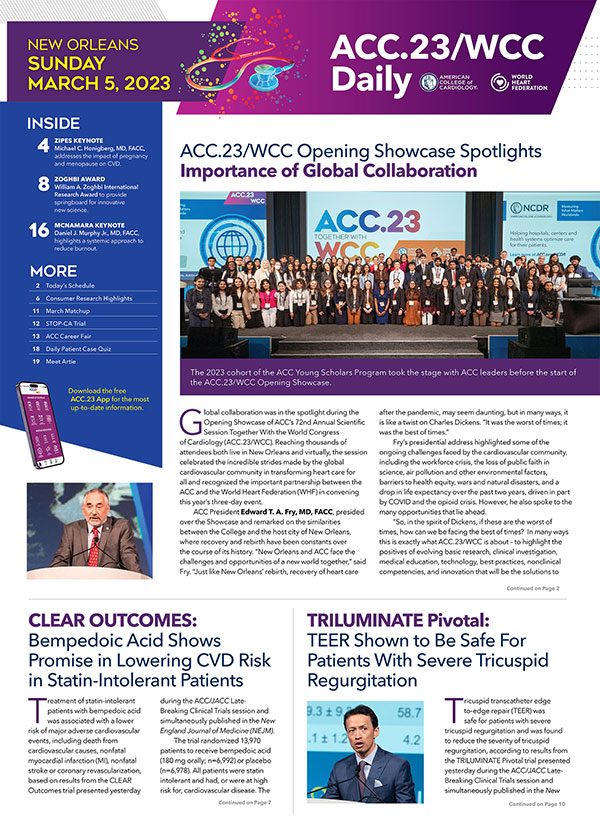Zipes Keynote Examines Impact of Pregnancy, Menopause on CVD

Women are unlike men in that they face unique factors across the life course that can influence or reveal their future risk of cardiovascular disease. Pregnancy and menopause represent two guideline-endorsed risk-enhancing factors for atherosclerotic cardiovascular disease that offer an opportunity for early intervention to manage these threats. The Douglas P. Zipes Distinguished Young Scientist Award Keynote will focus on these threats and opportunities.
"We still have a limited understanding of the mechanisms by which these conditions are linked to cardiovascular disease," says Michael C. Honigberg, MD, FACC, a cardiologist and researcher at Massachusetts General Hospital, who will deliver today's keynote address. "Therefore, it is still not entirely clear what a clinician is supposed to do about them. Beyond using adverse pregnancy outcomes and premature menopause as risk-enhancing factors to guide statin prescribing in those at borderline or intermediate cardiovascular risk, how else should we best incorporate this information in clinical practice?"
Honigberg first will focus on the hypertensive complications of pregnancy, specifically preeclampsia and gestational hypertension. While there are overlapping risk factors for hypertensive disorders of pregnancy and cardiovascular disease, such as obesity, there appears to be a strong genetic link between hypertensive complications in pregnancy and a genetic predisposition to chronic high blood pressure and cardiovascular disease, he says.
"It's almost like a red flag or an early warning sign that a woman who has a pregnancy with one of those complications [may be] at risk for accelerated development of chronic hypertension and cardiovascular disease," Honigberg says. "These women are showing us what their risk looks like if we don't do anything to change it. I use that as a tool to motivate them to implement durable lifestyle modification and, if appropriate, early preventive therapies."

– Michael C. Honigberg, MD, FACC
Honigberg will also address the menopause transition as part of his talk and examine the growing understanding of how reproductive aging might predispose women to cardiovascular disease or accelerate their cardiovascular disease risk. He will also focus on the role of genetics and how this can influence risk of cardiovascular disease over a woman's lifespan.
"We've understood for a while that the genes you are born with influence your lifetime risk of cardiovascular disease. But have more recently come to understand that the genetic mutations that we acquire across the lifespan, the so-called somatic mutations, also influence our risk of cardiovascular disease, as well as cancer and other age-related diseases," Honigberg explains.
Most cardiologists are not addressing these issues with pregnant patients, often because they are relatively young and appear to be at low risk for cardiovascular disease, says Honigberg. Similarly, pregnant women themselves might be thinking more about the health of their baby versus their own health, making it difficult to adopt meaningful behavior changes.
Honigberg says another interesting area of research would be to focus on how to support this high-risk population in changing or modifying behaviors. "There is so much that is interesting at the intersection of the medical and social aspects of motherhood. It is a call to focus on these risk factors in a clinical setting because it is important and is not often considered by clinicians or researchers."
Clinical Topics: Diabetes and Cardiometabolic Disease, Dyslipidemia, Prevention, Vascular Medicine, Nonstatins, Novel Agents, Statins, Hypertension
Keywords: ACC23, ACC Annual Scientific Session, ACC Scientific Session Newspaper, ACC.23/WCC Meeting Newspaper, Pregnancy, Pre-Eclampsia, Hydroxymethylglutaryl-CoA Reductase Inhibitors, Pregnant Women, Hypertension, Pregnancy-Induced, Menopause
< Back to Listings


